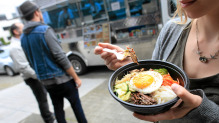VANCOUVER, BC – Just as the craze is beginning to wane in the United States, the food-truck trend is revving up in Canada. Across the country, from Vancouver to Hamilton to Toronto and Ottawa, a small but growing brigade of Canadian chefs are taking their food to the streets, following the path blazed in recent years by American food-truck vendors.
But can Canadians avoid the pitfalls of food-truck mania?
Jay Cho of Comafood truck in Vancouver says he got his inspiration to launch his Korean-Mexican-American food-truck business this spring from his years of working in Los Angeles, ground zero of the food-truck trend. Like many independent truck operators, Mr. Cho always wanted to open his own restaurant, but didn’t have the money for a bricks-and-mortar establishment.
“The leasing, buying up the space,
But after seeing the phenomenal success of L.A’s Kogi BBQ-To-Go, the Korean taco truck credited for starting the trend, Mr. Cho realized he, too, could roll out his kimchi quesadillas and Korean barbecue burritos. Since launching his truck about two months ago, business has been brisk in a city that, like most others in Canada, has been devoid of street-food options beyond hot dogs and fries.
“It’s been very busy,” Mr. Cho says. “I guess I’ve been doing it right.”
Strict municipal regulations have been blamed for limiting street foods. But as late adopters of the trend, Canadian cities, truck operators and diners may be able to learn from the American experience.
Jason Kessler, an L.A. writer for Bon Appétit magazine, says the food-truck craze veered downhill almost as soon as it began. In an essay last month, titled “I’m Sick of Food Trucks,” he lamented that the independent, grass-roots phenomenon has morphed into a cash grab.
“The first wave was exciting and fun, and it seemed like each truck represented a different kind of cuisine,” Mr. Kessler said by phone from Los Angeles. “But I think it probably first started to run away from the initial concept when the imitators started coming out.”
While grimy, mobile “loncheras,” or “roach coaches,” had existed in the city for years, it wasn’t until Kogi Korean BBQ-To-Go emerged that eating at food trucks became an event. Diners began following gourmet food trucks on social media, and showing up in droves wherever they stopped.
Find the entire article <here>




